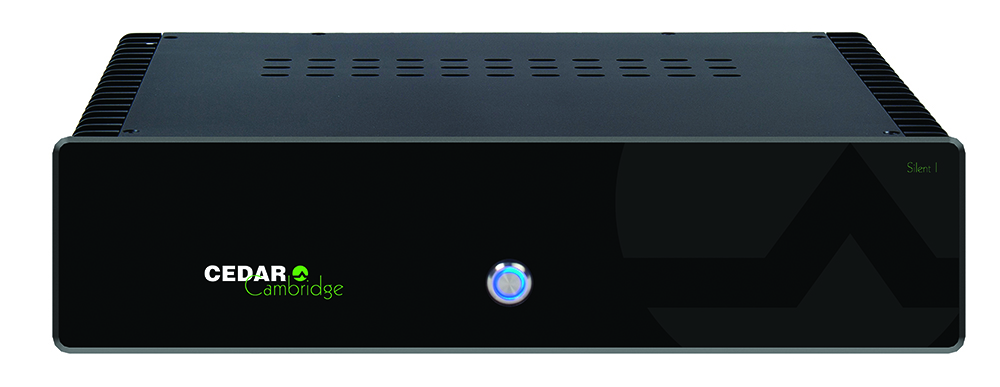What's new in CEDAR Cambridge Version 12

CEDAR Cambridge v12™ is the latest and most powerful incarnation of our renowned audio restoration, noise reduction and speech enhancement system, used worldwide for audio forensics, in sound libraries and archives, as well as for premastering and in other areas where the highest processing quality is required.
This is a significant update that comprises many new developments including:
- A new, silent hardware option
- An upgrade to the existing Series IV hardware
- A unique new processing module and an improved replacement for an existing one
- A new, more productive process management environment
- Clearer graphics
CEDAR Cambridge Silent 1 host system
Alongside the software upgrades, we are proud to introduce a new CEDAR Cambridge host to complement the latest version of our CEDAR Cambridge Series IV™ server systems.
Called CEDAR Cambridge Silent 1™, it's much smaller, much lighter and much more convenient than previous systems. Furthermore, it contains no moving parts (no rotating drives and no fans) so it makes no mechanical noise whatsoever and can be placed in the quietest studios without creating a distraction. Nonetheless, there's no loss of processing power. While the architecture of the Series IV remains ideal for larger establishments performing batch processing and supporting multiple seats using the system's networking capabilities, the Silent 1 is optimised for single users, for whom it is as fast and productive as its larger sibling.
CEDAR Cambridge v12 also dispenses with the 1U rackmount Timecode Automation Controller, which is no longer necessary for timecode and automation duties. This simplifies setup and reduces the amount of space needed for the system.
New module - Unwrap™
Wrapping is an unusual form of clipping distortion where, instead of being flattened at the maximum and minimum amplitudes of the audio format used, samples are wrapped around and appear with the right shape but at the wrong amplitude. This form of distortion only occurs on digital recorders, but has been encountered on devices ranging from small, handheld units such as interview recorders right through to the large, professional recorders used in the film and broadcast industries. The audible consequence of wrapping is a loud and aggressive form of distortion that can obliterate the wanted signal and seemingly render a recording completely useless.
Unwrap is a unique new process that eliminates this problem and which can rescue previously unusable audio, completely eliminating the distortion to reveal pristine, clear sound. It generates results that seem impossible until you hear it in action.
New module - Declickle 3™
Declickle 3 replaces and greatly improves upon the Declickle algorithm supplied on systems up to CEDAR Cambridge v11. It offers improved detection and removal of clicks and crackle in the presence of musical transients, removing the unwanted sounds in a more transparent fashion than ever before. It looks identical with previous versions so there is no learning to be done; it simply offers better results.
When upgrading to CEDAR Cambridge v12, Declickle 3 is provided as a free upgrade to owners of Declickle 2.
New process management
As always, the underlying philosophy of our processing architecture concentrates on combining simplicity of operation, speed of use, and productivity. To improve in all of these areas, CEDAR Cambridge v12 offers a revised process management system that combines all of the features found within the Process Manager and File Processing pages of previous versions. This makes it much quicker and simpler to use, shortening the learning curve and making the system even more productive than before.
Other new features include time slipping of one track against another. This allows operators to line up recordings, which will be of particular interest to users of the cross-channel adaptive filters. There's also the introduction of file sequences, which allows users to open sequences of files in a chain that can be saved as a single file. Useful for compiling material, this will also be of great interest to forensic users whose original audio may have been saved as a string of short snippets.
Presets and sessions
To help users who often work with the same processing chains, we have added Presets that can be saved and reloaded. These can save time and increase productivity when working on material with consistent problems - for example, recordings from a recording medium that exhibits recurring problems, or material that may have been recorded in a single environment with relatively constant noise issues.
Of even greater impact are the improved Sessions, which comprise a CEDAR Cambridge Workspace (.ccw) file plus a linked folder that contains the following items:
- the source audio
- an edit decision list (EDL) containing the history of the operations performed upon the audio
- audio files saved at each stage of processing
- graphic files that illustrate the processing decisions that you have made
- data regarding things such as the processes loaded, the relevant parameters, the screen layout, and other metadata
Together, these allow CEDAR Cambridge to reload a previous session complete with its undo/redo history, making it possible to return to a job after it was completed yet still be able to move forward and backward through the steps taken. This also means that you can work on a job at disparate times, but still be able to Undo and Redo as if you were working on it in a single sitting.
Furthermore, any reports generated will document all of the changes to the audio from the time when the audio file was first loaded and worked upon to the present day. This is a boon for archivists and forensic specialists who need to show exactly what actions were performed upon the audio from the moment that it was received - whenever that was.
Specifications subject to change without prior notification. E&OE.